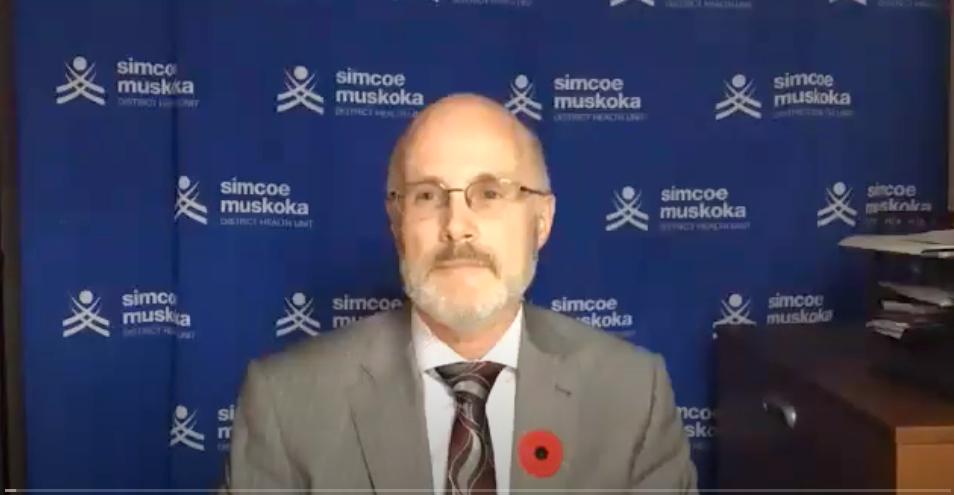With a sharp increase in COVID cases in Simcoe-Muskoka, local public health officials are considering additional restrictions for the region.
Dr. Charles Gardner, the region’s medical officer of health, said he and his team is working through the process and watching local case counts and hospitalizations closely.
There’s been a 95-per-cent increase in cases week-over-week, which has prompted Gardner to start working on recommendations for holiday gatherings.
“I’m concerned about social gatherings indoors,” said Gardner during a media briefing Nov. 10. “We’re looking at, as a health unit, whether there are additional requirements that we would put in place.”
The weekly incidence rate in Simcoe-Muskoka region is 41.9 cases per 100,000 people, which is nearly double the provincial average of 22.3 cases per 100,000 people. It’s not a position the Simcoe Muskoka District Health Unit is accustomed to, as it has spent most of the pandemic with an incidence rate about half that of the provincial average.
Gardner noted Sudbury is seeing even higher numbers with a weekly rate of 92 cases per 100,000.
The medical officer of health for Public Health Sudbury and Districts announced at the beginning of this week capacity limits would be reinstated to Oct. 9 levels from Step 3, effectively limiting capacity at bars, pubs, cinemas, restaurants, and sporting venues.
“We need to be aware … we could end up at [Sudbury’s] level of transmission if we’re unfortunate,” said Gardner.
The doctor isn’t proposing a lockdown, however.
“That’s certainly not something anybody wants … the restrictions in Sudbury were capacity limits. Not anything like a lockdown, even where they’ve had much higher rates than here,” said Gardner.
Even without added restrictions, Gardner said residents in the region can help bring down case rates by following all public health measures.
“I think people need to take to heart the protective practices at their disposal to reduce transmission to themselves and others,” said Gardner.
“Vaccination alone, while being the single most important protective thing you can do is not sufficient … we still get breakthrough cases … you need to continue with these other practices [hand washing, wearing a mask, self-screening, and seeking testing if you develop symptoms]," he said.
Gardner said about 65 per cent of the region’s cases are in unimmunized individuals (including children), while another 30 per cent are people who are fully immunized.
The doctor is also recommending people shrink their social circles to prevent COVID spread.
"It is safer to identify a smaller group of people to be in close contact with in your life and stick to that solid group of people," said Gardner.
Based on the transmission data collected by the health unit, there have been exposures (two or more cases) at food premises, recreation facilities, two motel/hotel and short-term rental locations, some multi-unit dwellings, places of worship, and workplaces.
“There are a variety of places now in which exposures are happening,” said Gardner. “There’s a potential, as an explanatory point, for people to be relaxing their practices with regard to physical distancing because they’re feeling a sense of security about being fully immunized. That would lead to more exposure in the community and in their social lives. This may be part of what’s happening with regard to transmission.”
Gardner noted the health unit also deals with non-compliance from people who have tested positive for COVID-19, but who refuse to answer the phone, stay home from work, and/or provide information on close contacts.
While they can be fined for returning to work, Gardner said there’s not much recourse to take if a person does not provide information on who their close contacts are.
“As time goes on, it can be increasingly difficult with pandemic fatigue, to get cooperation,” said Gardner.
The province announced today it is pausing its reopening plan that would have lifted capacity limits on higher-risk settings like strip clubs, bars with dancing facilities, sex clubs, and bathhouses.
